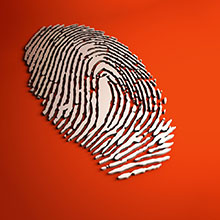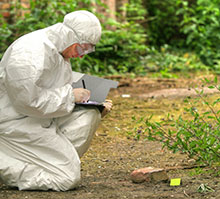Forensic Science - Considering a Forensics Degree?
Rising Interest in Forensic Science Degrees
During last five years we have seen a massive increase in the number of forensic science degrees offered in UK universities. This has possibly been fuelled by TV programmes and series that look at the role of forensic science in police and detective work.
Unfortunately, the number of jobs in forensics have not really increased to keep pace, so if you are interested in doing a forensic science degree course you need to keep your options open and be prepared to go the extra mile if you want to compete in the job market. Choosing a degree course that offers a year in industry or other relevant work experience is now a priority for many potential forensic science students.
Which universities offer forensic science degrees?
 When considering your choice of course, a good place to start is by looking at the degree courses accredited by The Forensic Science Society in the UK. Universities offering courses in this area apply to the Society to undergo an accreditation process that assesses the relevance of their course content to employment in real-life forensics.
When considering your choice of course, a good place to start is by looking at the degree courses accredited by The Forensic Science Society in the UK. Universities offering courses in this area apply to the Society to undergo an accreditation process that assesses the relevance of their course content to employment in real-life forensics.
Currently accredited forensic science degrees include:
- University of Abertay at Dundee – BSc Hons in Forensic Science, accredited in 2008.
- Anglia Ruskin University – BSc and MSc in Forensic Science, accredited in 2011.
 University of Central Lancashire – a range of degrees, all accredited in 2011.
University of Central Lancashire – a range of degrees, all accredited in 2011.- Cranfield University – five difference MSc courses in forensic science including Forensic Ballistics, accredited in 2011.
- Dr Montfort University – BSc in Forensic Science, accredited in 2009.
- University of Derby – two BSc courses, both accredited in 2007.
- University of Glamorgan – a range of BSc degrees in Forensic Science, including two sandwich courses offering work experience in industry. Two courses were accredited in 2008 and the newer offerings received the Society’s seal of approval in January 2013.
- University of Huddersfield – one BSc course and two MSc courses. The main curriculums in Forensic and Analytical Science were accredited in 2008 with the new course, specialising in postgraduate forensic science, was accredited in 2011.
- Keele University – BSc course accredited in 2011.
- University of Kent at Canterbury – a range of BSc and MSc degrees in Forensic Science and Forensic Chemistry, some offering a year in industry. Four accredited in 2007 with the rest in 2011.
- Kings’ College London – an MSc in Forensic Science, accredited in 2011.
- University of Lincoln – a BSc course, accredited in 2011.
- London South Bank University – a new BSc and MSc in Forensic Science, accredited last year (2012).
- Nottingham Trent University – three BSc courses, two accredited since 2007, while Forensic Biology was accredited in June 2012.
- University of Portsmouth – BSc degree, accredited in 2009.
- The Robert Gordon University – one of the few Scottish universities to offer a BSc in Forensic and Analytical Science, accredited 2011.
- Staffordshire University – BSc, MSc degrees and a postgraduate certificate and diploma, accredited 2011.
- University of Strathclyde – two MSc courses; Forensic Science and Analytical Chemistry accredited 2007 and Forensic Science, accredited 2008.
- Teesside University – a range of BSc and MSc courses including Computer and Digital Forensics, some accredited 2007, some 2011.
 The University of the West of England – three BSC courses in Forensic Science, Forensic Chemistry and Forensic Biology, all accredited 2011.
The University of the West of England – three BSC courses in Forensic Science, Forensic Chemistry and Forensic Biology, all accredited 2011.- University of Wolverhampton – two BSc degrees, accredited in 2012.
- University of Worcester – a BSc in Forensic and Applied Biology, accredited by the Society in 2010.
Study options in Forensic Science
The range of accredited degree courses available means that you can choose the area that you want to specialist in (criminal investigation, anthropology, ballistics or even explosives). It is possible to do a first degree in forensics or to study a science subject – a good choice is chemistry – and then do a post-graduate qualification in forensic science. This will probably give you a better chance of gaining entry into a job involving more complex lab work, rather than acting as a scene of crime officer – often described as a ‘soco’.



